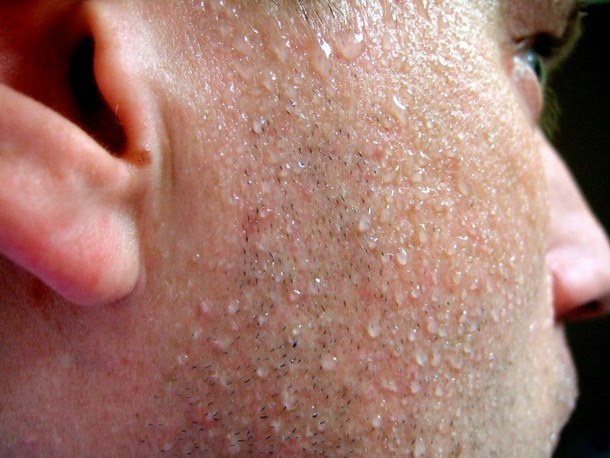Endocrine diseases
Causes of excessive sweating are endocrine diseases: thyrotoxicosis, acromegaly, pheochromocytoma, menopause, hypoglycemia, diabetes. Hyperhidrosis is a temporary symptom of these conditions, but the probability of its development is quite large.
For hyperthyroidism characterized by a General sweating of a body caused by the acceleration of metabolism in tissues. This is compensatory as the body needs to prevent the increase in body temperature. Aside from the copious perspiration patient complains of palpitations, surges in blood pressure, weight loss, weakness, emotional instability, increased appetite, fine tremor of the extremities, menstrual disorders. But, in spite of increased sweating, the skin of the whole body remains hot and humid. There is a direct correlation between the level of thyroid hormones in the blood and intensity of sweating: the more hormones, the more the sweating.
Diabetes is accompanied by generalized sweating that is caused by increased metabolism, increased heat production of the body and nervous system. For such patients is characterized by sweating of the head, neck, and entire upper torso. With a sharp drop in blood glucose hypoglycemia occurs, which is manifested by sweating, tremor, development of pre-existing conditions. The cause of hypoglycemia - insulin overdose. A similar condition occurs in healthy people during a severe famine, after poisoning with alcohol or aspirin.
Menopausal syndrome is most often seen in excessive sweating. This is the most characteristic manifestation of the disease, which may be associated with sensation of heat and tides in the upper half, the torso and the face. Cause of excessive sweating in this case is the aging structures of the hypothalamus that control the activity of glands of internal secretion and the release of biologically active substances in the blood, contributing to a dramatic expansion of skin vessels and increased sweating.
Infectious diseases
Excessive sweating is a symptom of most acute and chronic infectious diseases. Endogenous pyrogen is produced in the human body in the interaction of the immune system with substances that cause fever. Excessive sweating in fever regulator of body temperature. During evaporation of sweat from the skin, the body temperature decreases, which leads to the improvement of the General condition of the patient. Hyperhidrosis constant symptom of malaria, tuberculosis, septicaemia and brucellosis.


